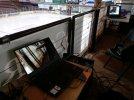I'm not trying to be evasive, it is just that a fairly accurate/usable answer requires a LOT more info than you've provided
So, realize that real-time video encoding is computationally demanding. And laptops often have much performance capabilities in part due to space constraints and resulting lower thermal limits. Can a laptop work, depending on requirements? sure
Using WiFi, is NOT a good idea. Wifi is not designed for consistent jitter/latency. Can it work in certain circumstances? yes, but be prepared for the time it doesn't, and unless you have real-time WiFi spectrum analysis tools, and know how to use them, you may be SOL
with the exception of the very latest WiFi specs, most WiFi is more like a walkie-talkie than modern telecommunication system. the more clients, the more congestion, and 1 misbehaving client can ruin it for everyone.
As for bitrate... it depends. start with - what is your planned resolution and frame rate? and what is the bottom end, always available regardless upload bitrate that is available (NOT what a speed test indicates, which is the most optimistic (occasional) results?)
Search
The above and how many camera feeds will largely determine your minimum hardware requirements, but then you need to add expected system lifecycle (ie how many years of service), future and other requirements, etc
There have been numerous recent threads from off-road cross country bicycling racing, etc and setups required for those (multiple cameras over multi-mile course). Are you planning a single camera operation, or multiple? if multiple, and which connection technology?
So, I'd approach the issue this way:
- Is the plan to locally record (for higher video quality) in addition to livestreaming?
- recognize that accurately capturing high-speed motion requires a decent video bitrate, which impacts PC hardware resource demands as well as bandwidth
was prior choppy video experience on a laptop? any thermal monitoring in place to ensure system not thermal throttling (being in an ice rink arena helps, but doesn't prevent this from being a consideration). Unfortunately, identifying thermal throttling is not always simple.
- From a requirements perspective - What is more important - video quality or having real-time livestream? And what bandwidth is available?
The better video quality, especially if upload bandwidth constrained is to locally record, and upload (higher bitrate video) later... but of course that will be hours later
Presuming livestream is the goal
- I'd strongly suggest trying to arrange spot for your OBS Studio computer that has a power outlet and an Ethernet cable
Trying to use a site's Guest WiFi is unlikely to be satisfying (unless a big city professional stadium level network).
Yes, there are ways, in collaboration with site network admin, to create an isolated WiFi network that might work.
Personally, I used an older professional workstation laptop, and other than some corporate security software driven glitches, it was fine for 1080p30 video. You have to ask yourself, what video resolution are you targeting? If buying something for this specifically, and only planning 1080p for now, will that be okay for 3-5 years? Will 4K video, maybe even 4Kp60, be a thing in this systems' lifetime? 4K video (2160p) is 4x data handling as 1080p. I avoid consumer laptops more that pandemics. Depending on situation, if a consumer grade gear is required, then I'd be looking at a gaming oriented system (skipping the fast refresh monitor) as those tend to have better thermal design. As I like to get 5+ years (if not 10 out of non-video oriented computers), I've stuck to i7 CPUs for long-term performance and value.
Today, you are still looking at primarily H.264 encoding, with YouTube AV1 being a bleeding edge option. AMD H.264 has been poor for many years. so, your typical recommendation will be nVidia NVENC or Intel iGPU depending on video requirements. IF you want high confidence of something just working today for decent GPU offload for encoding, then a NVENC equipped GPU is your best bet. Assuming not actually gaming with this rig, a lower-end nVidia GPU is likely to be fine
As for CPU. Personally I find AMD CPUs to be better, more secure, more power efficient, etc. But AMD's software is lacking, and we all use computers as a system... so I get Intel, reluctantly. I'm looking for a new upper-end mobile system myself, with a HX CPU. I won't be even looking at 12 gen or earlier Intel. But there are good deal on such prior gen CPUs available if budget so constrained
Do you want this computer to be able to handle 4K video editing at some point? then GPU RAM comes into play (DaVinci resolve recommends 8GB or more)
GTX 1650 originally came out with the older NVENC, with the newer revision supposedly being much better. Supposedly some newer desktop 1650s have the newer GPU chips... but that is 3+ generations old at this point. For OBS Studio, I'm currently using a business class PC with a 10th gen Intel i7 and a GTX 1660 Super and that is complete overkill for 1080p30. But I got a system at the time that could handle 4K real-time video editing
Personally, I found using OBS Studio on a single laptop monitor to be too confining, especially with older eyes. an external monitor really helped, but depends on how much compositing you are doing. A single monitor for a largely static overlay and full screen-video should be fine.

